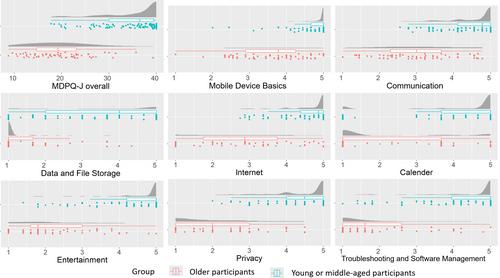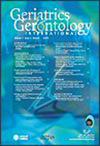Development of the Japanese version of the Mobile Device Proficiency Questionnaire: A cross-sectional validation study
Abstract
Aim
In response to the growing popularity of mobile devices among older adults in Japan, this study aimed to establish a reliable and valid measure of mobile device proficiency by developing a Japanese version of the Mobile Device Proficiency Questionnaire (MDPQ-J) for the Japanese population.
Methods
To evaluate the reliability and validity of the MDPQ-J, we administered the questionnaire to 100 young or middle-aged participants (37.78 ± 13.90 years, 57.00% women), and 62 older participants (75.90 ± 6.01 years; 59.68% women).
Results
The MDPQ-J showed a high degree of internal consistency (Cronbach's α = 0.98). Moreover, MDPQ-J scores in older participants tended to be lower than those in young or middle-aged participants. In terms of validity, the MDPQ-J score of older participants was significantly associated with age (ρ = −0.31), the amount of time using a mobile device per day (ρ = 0.64), and the system usability scale (ρ = 0.39). Additionally, the MDPQ-J scores were significantly positively associated with the importance (ρ = 0.37), performance (ρ = 0.57), and satisfaction (ρ = 0.29) associated with daily mobile device use in older participants.
Conclusions
The high reliability and validity of the MDPQ-J in the Japanese population highlight its utility in adapting mobile devices for older adults, which is crucial in an increasingly digital society. Further research should explore the mediating role of mobile device proficiency in various health-related outcomes. Geriatr Gerontol Int 2024; 24: 1223–1232.


 求助内容:
求助内容: 应助结果提醒方式:
应助结果提醒方式:


